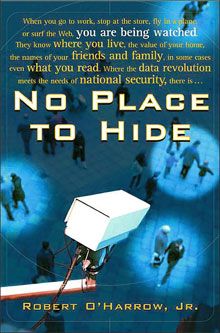Book Notes
 Robert O'Harrow, Jr., No Place to Hide (New York: Free Press, 2005), 348pp.
Robert O'Harrow, Jr., No Place to Hide (New York: Free Press, 2005), 348pp.
At the major intersection near my house, our kids like to point out the security cameras that track every single car that passes underneath. At our bank ATM, if you look up and slightly to the left, you'll see a camera about eighteen inches from your face. The last four digits of your social security number, pin numbers, and your mother's maiden name are now common place codes, laughably outmoded according to this book, that we use multiple times every day in an effort to secure our identities. Welcome to the "emerging surveillance society" (p. 283) documented in chilling detail by Robert O'Harrow, an award-winning reporter for the The Washington Post.
You probably have not heard about ChoicePoint, Acxiom, Seisint, or similar companies, but they know lots about you. With a few key strokes they can mine their data banks of 100 billion documents that store the digital details of the lives of 200 million people, including your photo, parking tickets, bank overdrafts, gender, medical and police records, buying habits, rental transactions, car preferences, and the like. No need to linger, either, as that will only take a few seconds. Want to know the name and address of every Hispanic female between the ages thirty and fifty who lives in New Jersey or Colorado and drives a red Ford with license plates that begin with the letter S and end with the number 5? That will take only a few seconds, too. These sophisticated digital dossiers of your private information used to be available only to the government, law enforcement, and mass marketers, but for a small price some firms now make them available to ordinary citizens.
If you wish to opt out of this Orwellian web, forget it. Numerous firms have already created unique, electronic tags for virtually every person in the United States. Data is forever, and while you might run, you cannot hide. The exponential advances in computer hardware and software have taken data retrieval, storage, crunching, and analyzing to a whole new level. Terrorism and its concomitant paranoia fuel the urge for info. Sure, most people have heard of identity theft or maybe even biometrics like iris scans or face recognition systems, but O'Harrow makes a good case that the vast majority of us have no inkling of the scale and scope of information-gathering about people, and no sense for the ominous implications of data as a financial commodity, a source of power, and an ostensible tool of national security.
True, all this manipulation of data makes our lives more efficient, safe and secure. For example, not long ago a merchant advised me that his machine had rejected my credit card when I tried to pay for my purchase. When I called my credit card company, they transferred me to their fraud department which advised me that their computers had detected erratic patterns with my card number and so shut it down. Sure enough, when we reviewed my last several purchases, we verified that someone had stolen my number and tried to make purchases with my card.
But do the benefits outweigh the liabilities? There are powerful cross currents of conflicting interests. Laws lag way behind technological advances. Patriotism drives national security, but civil libertarians rightly warn of encroachment upon personal privacy and freedom. Corporations, largely unregulated or self-regulated, eager for profits, can do what laws prohibit the government from doing. Malevolent abuses by sophisticated groups like al-Qaeda raise even scarier matters. Mistaken identity, security breaches, data accuracy, false positives, and many other unintended but inevitable consequences of digital dragnets loom large.
The French sociologist Jacques Ellul defined technology as ruthlessly rational efficiency. O'Harrow documents just such a world that is already here. Consider the last four sentences of his book: "Our lives are being recorded. It is like all of these electronic diaries are being kept by different people. Only we have no control over the diaries, and we can't even know what they say about us. And there's no place to hide."


